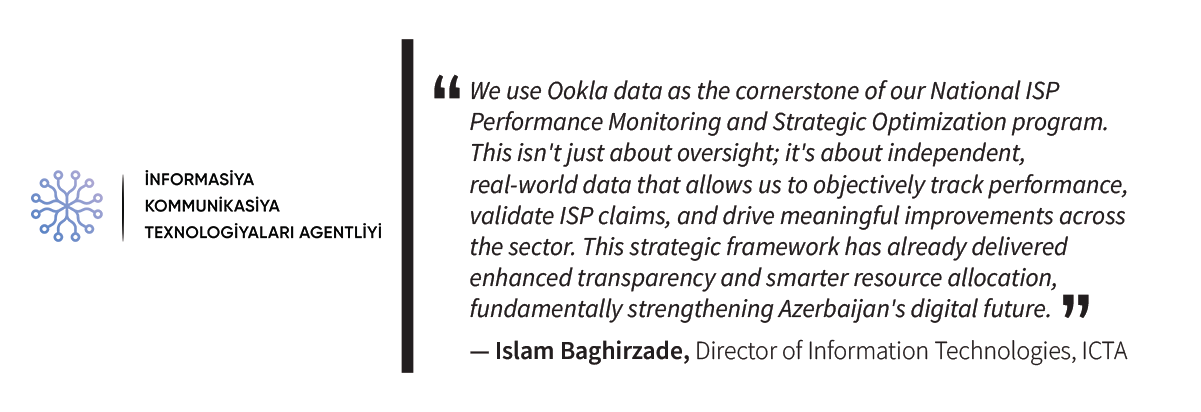Ensuring reliable and competitive broadband performance across Azerbaijan is critical for the country’s digital transformation. Fast, accessible internet plays a central role in education, economic growth, public services, and everyday life. As the national regulatory authority, the Information Communication Technology Agency (ICTA) is tasked with overseeing the performance, fairness, and transparency of the telecommunications market — particularly internet service providers (ISPs).
To effectively monitor this ecosystem, ICTA relies not only on official declarations from providers — such as subscriber counts and regional coverage areas submitted through the Data Collection System (DCS) — but also on independent, real-world testing data from Ookla.


Situation
While ISP-reported figures are foundational for regulatory oversight, there is always a risk of overstated or understated service availability, especially in remote or underserved regions. Such discrepancies can lead to distorted planning, inefficient infrastructure development, and regulatory blind spots.
Moreover, with dozens of ISPs operating at different performance levels, it’s not feasible to demand equal improvements across the board. Regulatory capacity and resources are limited, and not all providers have the same impact on national service quality. A targeted, data-driven strategy is needed to identify which providers can most significantly influence nationwide internet performance.
Under the framework of National ISP Performance Monitoring, ICTA faced four challenges in ensuring fair, efficient, and data-driven oversight of internet service providers:
- Monitoring Provider Performance Objectively: ISP-reported data on service quality lacks independent verification. ICTA needed a consistent method to track monthly performance trends across providers, highlight underperformers, and drive QoS improvements across the sector.
- Validating Regional Coverage Declarations: ISPs declare their regional subscriber presence via the Data Collection System (DCS). However, without real-world validation, these declarations could misrepresent actual service distribution — especially in rural or underserved areas — distorting planning and policy decisions.
- Prioritizing Impactful Improvements: With limited regulatory resources, ICTA needed a tool to identify which ISPs provide poor services, thus, hindering achieving the country’s internet speed objectives. A scalable, simulation-based approach was essential to target high-impact providers rather than applying blanket requirements.
- Road-Level Signal Monitoring: Mobile service quality often fluctuates along roads and transport corridors, disrupting calls and data connectivity. Manual drive tests to detect such issues are costly and limited in scope. Using Ookla Cell Analytics, ICTA now monitors signal strength continuously across major roads in Baku, with GPS-tagged results from real users highlighting weak spots and guiding more effective infrastructure planning.
Download the full case study
Check out our full case study to learn more about how ICTA how ICTA uses independent, real-world testing data from Ookla to monitor connectivity in Azerbaijan.
Ookla retains ownership of this article including all of the intellectual property rights, data, content graphs and analysis. This article may not be quoted, reproduced, distributed or published for any commercial purpose without prior consent. Members of the press and others using the findings in this article for non-commercial purposes are welcome to publicly share and link to report information with attribution to Ookla.
About the Author

Ookla
Ookla® is a global leader in connectivity intelligence that provides consumers, businesses, and other organizations with data-driven insights to improve networks and connected experiences.
![How ICTA Uses Ookla Data for National ISP Performance Monitoring [Case Study]](https://www.europesays.com/uk/wp-content/uploads/2025/10/icta_casestudy_header-1200x628.jpg)